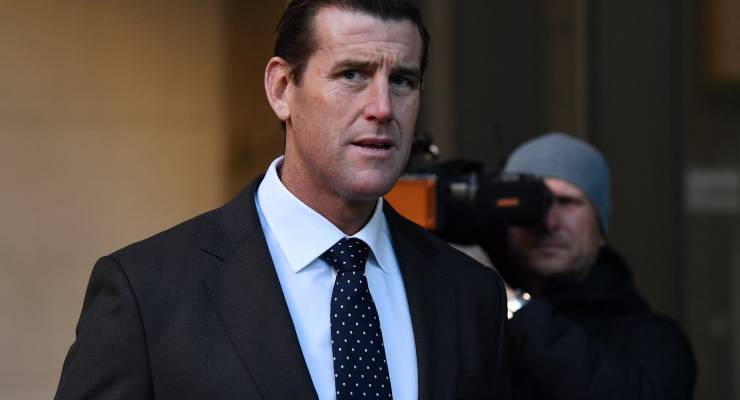
Former SAS captain turned politician Andrew Hastie this morning prayed with his father for Ben Roberts-Smith. After that, the assistant defence minister gave evidence in the Roberts-Smith’s defamation case, saying he pitied rather than disliked his former comrade.
“I don’t want to be here, I was subpoenaed to be here. This morning I rang my father and asked him to pray with me,” he told the court.
“This [case] is terrible for the country, terrible for the SAS and the army,” he said, adding that “no one wants to see this but until we deal with it, we can’t move forward.”
“I don’t dislike Ben Roberts-Smith, I pity him, I pity him for this process [the court hearing],” he said.
This morning, counsel for Roberts-Smith, Arthur Moses SC, asked Hastie about rumours circulating among the military about Roberts-Smith’s actions in Afghanistan.
The minister agreed that he had no personal interaction with Roberts-Smith since 2010 and had based his opinion of his actions and character on conversations with other soldiers.
Hastie was also asked about his professional relationship with Nick McKenzie and Chris Masters, the journalists who wrote the stories about Roberts-Smith.
The former war hero is currently suing three newspapers over a series of stories in 2018 that he says portray him as a war criminal and a bully and accuse him of the act of domestic violence against Person 17. He denies all wrongdoing.
The newspapers are seeking to rely on a defence of truth, and allege that in Afghanistan Roberts-Smith was involved in six murders of PUCs (persons under control, or prisoners of war).
Under the rules of engagement, these people cannot be killed. The former soldier maintains he did not bully Person 1 and that any killings in Afghanistan were carried out lawfully in the heat of battle.
Hastie agreed that he had a good professional relationship with both McKenzie and Masters but denied that he had used these relationships to further his position as a politician by feeding them information about the Victoria Cross winner.
The politician told the court that he had heard that a soldier called Person 1 had been bullied by Roberts-Smith.
In 2012 he had been sitting with a group of soldiers at a defence training area in Western Australia.
As they ate breakfast, the Seven Network’s Sunrise program was being broadcast. They watched Roberts-Smith on the show “in his service dress [and] full medals … talking about mental health charities that he was supporting”, he said.
“One of the men said, ‘RS gave Person 1 depression; now he’s going to help him fight it’, and everyone laughed,” Mr Hastie said. “Laughter was the only response, but not at the expense of Person 1.”
Person 1 has already given evidence, saying that Roberts-Smith had told him that if his performance did not improve he would “get a bullet in the back of the head”.
Yesterday afternoon Person 17, Roberts-Smith’s former lover, was questioned extensively about the end of the relationship, during which time she claimed to have had a miscarriage.
She was asked by Bruce McClintock SC why she hadn’t told Roberts-Smith about it.
“We had been arguing all week. He was cutting off contact with me and wasn’t answering my calls,” she said.
Instead, Person 17 said she would travel from her home to Brisbane for a termination. Roberts-Smith had said he would accompany her to the procedure.
McClintock said to her that her communications had been a “calculated campaign of deceit” that had been “appallingly dishonest … and manipulative”.
In tears, she told the court, “I still wanted to see him face to face, I was still going through something awful.”
The following day, she went to Roberts-Smith’s matrimonial home and confronted his wife with the news of the affair. After that, the former soldier cut off all contact with her and refused to return her calls or respond to messages.
Later that month, she made two visits to the local police station. The police report notes that both times she said she had been having an affair with a high-profile military person and that she was scared about “the things he might do”. However, the police took no action because she would not give them Roberts-Smith’s name. She did not mention the alleged assault to the police.
The following month, she went to see investigative journalist Nick McKenzie and told him about her relationship with the soldier and the fact that he had struck her on the head after an argument.
By this time, the “love you felt for [Roberts-Smith] had turned to hatred because he had rejected you”, McClintock said.
“No,” she replied.
“And you had decided to wreak public revenge on him,” the counsel said.
“No,” she replied.
“By making a false allegation of assault,” McClintock said.
“No,” she replied.
The hearing continues.








Crikey encourages robust conversations on our website. However, we’re a small team, so sometimes we have to reluctantly turn comments off due to legal risk. Thanks for your understanding and in the meantime, have a read of our moderation guidelines.